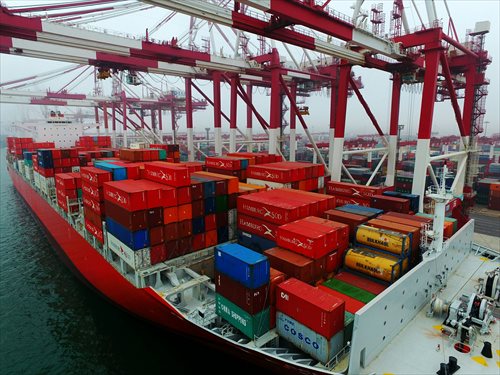S.Korean companies in China say they’re not impacted by anti-missile system
Experts note the two countries are economically interdependent

A ship from South Korea unloads goods at a port in Qingdao, East China’s Shandong Province, on June 21. Photo: IC
The economic relationship between China and South Korea will not likely be affected in the wake of South Korea's decision to deploy an advanced missile defense system, as the two countries are economically interdependent, experts noted Monday.
South Korean companies in China have also shown confidence in further exploring the Chinese market.
On July 8, US and South Korea jointly announced the deployment of the Terminal High Altitude Area Defense (THAAD) anti-missile system, despite continued opposition from neighboring countries including China, Xinhua reported the same day.
In the wake of the announcement, various South Korean household brands, including Lotte Group and LG Corporation, told the Global Times on Monday that their business in China was running as usual, with limited impact from China's opposition to the missile system.
The Korean International Trade Association's Beijing office refused to comment on the matter when contacted by the Global Times on Monday.
But on Friday South Korea's Joongang Daily cited Choi Yong-min, the head of the Korean International Trade Association's Beijing Office, as saying that there hasn't been "a notable change" in China's situation, and no trade sanctions had been imposed on South Korea to date.
His comment comes amid a booming economic relationship between China and South Korea in recent years.
In June 2015, the two countries officially signed a free trade agreement (FTA).
The agreement went into effect in December the same year and was projected to lift the GDPs of South Korea and China by 1 percent and 0.3 percent, respectively, over the next decade, chinanews.com reported in June 2015, citing the Ministry of Commerce (MOFCOM).
In 2015, trade volume between China and Korea reached $227 billion, up from $215 billion in 2012, among which, Korea's exports to China amounted to $137 billion, accounting for 23 percent of its total exports, making China its largest market as of 2015, according to data published on the website of the MOFCOM in March.
Bilateral investment has also increased sharply. According to a report in The Korea Herald this month, South Korean companies invested $2.2 billion in China during the January-May period of 2016, up 12.2 percent year-on-year. The investment is expected to reach $5.3 billion in 2016 based on the rate recorded in the first five months, the report noted.
Future prospect
Given the increasingly close economic ties, experts noted that the deployment of the THAAD anti-missile system is not likely to have a considerable impact on bilateral trade and capital inflow in the long run.
Chen Fengying, a research fellow at the China Institutes of Contemporary International Relations, said that the China-South Korea FTA is a treaty of the highest level in the Asian region, showing that the two economies are inextricably interwoven with each other.
"Many enterprises in China and South Korean are placed in the same industry chains, with roles that focus on different procedures, which mean the two countries' economies are dependent on each other… It is hard to imagine what will happen if their economic relationship was jeopardized or even halted" Bai Ming, a research fellow at the Chinese Academy of International Trade and Economic Cooperation, told the Global Times on Monday.
Bai cited an example in the electronic product industry, where China assembles and manufactures intermediary goods imported from South Korea, and then exports them to other parts of the world.
"Some South Korean industries, including the cosmetics and tourism sectors, rely on a large Chinese market. " Chen noted.
Analysts also envisioned a bright outlook for the two countries' economic cooperation, as the trade agreement enhances the cooperative relationship between China and South Korea.
Shi Yuanhua, a professor of Institute of International Studies at Fudan University, told the Global Times Monday that due to the FTA, China's foreign trade volume with South Korea is going to reach $400 billion within 5 years.
His comment is echoed by a spate of South Korean companies like CJ Corporation and Orion Corporation, who told the Global Times Monday that they forecast a promising business prospect in China, with some saying that they will scale up investment in China.
Tech giant Samsung Electronics Co also said that the company has confidence in the Chinese market and will expand investment into this market to develop state-of-the-art technologies and diversify its businesses, an interior source at Samsung told the Global Times on Monday.